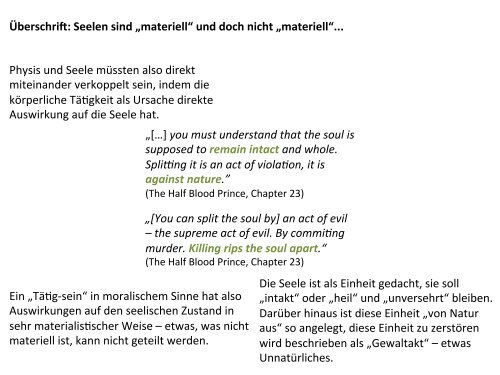Harry_für_Donnerstag
Create successful ePaper yourself
Turn your PDF publications into a flip-book with our unique Google optimized e-Paper software.
Überschri): Seelen sind „materiell“ und doch nicht „materiell“... <br />
Physis und Seele müssten also direkt <br />
miteinander verkoppelt sein, indem die <br />
körperliche TäDgkeit als Ursache direkte <br />
Auswirkung auf die Seele hat. <br />
„[…] you must understand that the soul is <br />
supposed to remain intact and whole. <br />
Spli4ng it is an act of viola9on, it is <br />
against nature.” <br />
(The Half Blood Prince, Chapter 23) <br />
„[You can split the soul by] an act of evil <br />
– the supreme act of evil. By commi9ng <br />
murder. Killing rips the soul apart.“ <br />
(The Half Blood Prince, Chapter 23) <br />
Ein „TäDg-‐sein“ in moralischem Sinne hat also <br />
Auswirkungen auf den seelischen Zustand in <br />
sehr materialisDscher Weise – etwas, was nicht <br />
materiell ist, kann nicht geteilt werden. <br />
Die Seele ist als Einheit gedacht, sie soll <br />
„intakt“ oder „heil“ und „unversehrt“ bleiben. <br />
Darüber hinaus ist diese Einheit „von Natur <br />
aus“ so angelegt, diese Einheit zu zerstören <br />
wird beschrieben als „Gewaltakt“ – etwas <br />
Unnatürliches.
Überschri): Seelen sind vom Körper getrennt und doch nicht getrennt... <br />
"They call it the Dementor's Kiss," said Lupin, <br />
with a slightly twisted smile. "It's what <br />
Dementors do to those they wish to destroy <br />
uOerly. […] they clamp their jaws upon the <br />
mouth of the vic9m and -‐-‐ and suck out his <br />
soul.” <br />
(The Prisoner of Azkaban, Chapter 12) <br />
“Look, if I picked up a sword right now, <br />
Ron, and ran you through with it, I <br />
wouldn’t damage your soul at all.” […] <br />
But my point is that whatever happens <br />
to your body, your soul will survive <br />
untouched […].” <br />
(The Deathly Hallows. Chapter 6) <br />
Egal, was dem Körper zustößt, <br />
die Seele bleibt davon <br />
unberührt! <br />
Seele ist also materielle Substanz, welche als <br />
vom Körper getrennt exisDeren kann. <br />
Dies kann doch nur innerhalb einer KonzepDon <br />
plausibilisiert werden, in welcher Körper und <br />
Seele als voneinander getrennt, bzw. als nicht <br />
notwendigerweise aufeinander angewiesen <br />
gedacht werden.
Überschri): Seelen sind kons>tu>v für das „ICH“ (Erinnerung/Selbstgefühl)... <br />
[…] "What -‐-‐ they kill -‐-‐?" <br />
"Oh no," said Lupin. "Much worse than that. <br />
You can exist without your soul, you know, as <br />
long as your brain and heart are s9ll working. <br />
But you'll have no sense of self anymore, no <br />
memory, no...anything. There's no chance at <br />
all of recovery. You'll just exist. As an empty <br />
shell. And your soul is gone forever...lost." <br />
(The Prisoner of Azkaban, Chapter 12) <br />
Ein „sense of self“, also das <br />
„Selbstbewusstsein“ oder das „Ichgefühl“ und <br />
Erinnerung ist verbunden mit der Seele! Seele <br />
kons>tuiert also das „Ich“. <br />
Seele ist nicht Quelle des „Lebens“...
Überschri): Ist die Seele verantwortlich für Moral...? <br />
“Isn’t there any way of pu
Überschri): Seele ist nicht (grundsätzlich) Quelle von Gedanken... <br />
„[...] without his Horcruxes, Voldemort will be a <br />
mortal man with a maimed and diminished <br />
soul. Never forget, though, that while his soul <br />
may be damaged beyond repair, his brain and <br />
his magical powers remain intact. It will take <br />
uncommon skill and power to kill a wizard like <br />
Voldemort even without his Horcruxes.” <br />
(Half Blood Prince Chapter 23)
Überschri): Instabilität der Seele à Körperliche Folgen... <br />
Lord Voldemort has seemed to grow less <br />
human with the passing years, and the <br />
transformaAon he has undergone seemed to <br />
me to be only explicable if his soul was <br />
mu9lated beyond the realms of what we <br />
might call ‘usual evil’ . . .” <br />
(Half Blood Prince Chapter 23) <br />
The thin man stepped out of the cauldron, <br />
staring at <strong>Harry</strong> . . . and <strong>Harry</strong> stared back into <br />
the face that had haunted his nightmares for <br />
three years. Whiter than a skull, with wide, <br />
livid scarlet eyes and a nose that was flat as a <br />
snake’s with slits for nostrils . . . <br />
Lord Voldemort had risen again. <br />
(The Goblin of Fire Chapter 32) <br />
„Menschlichkeit“ nach innen durch „Seele“ <br />
und nach Außen durch den Körper!?
Überschri): Bisherige Analyseinhalte zusammengefasst: <br />
Seelen sind „materiell“ und doch nicht „materiell“... <br />
Seelen sind vom Körper getrennt und doch nicht getrennt... <br />
Seelen sind konsDtuDv für das „ICH“ (Erinnerung/Selbstgefühl)... <br />
Seelen für sich scheinen keine physikalische „Wirkkrag“ zu haben... <br />
Auch ohne Seele noch Gefühle (rein körperliche!?) und Gedanken..! <br />
Seele ist nicht Quelle des „Lebens“... <br />
Seele ist nicht (grundsätzlich) Quelle von Gedanken... <br />
Zerstörung der Seele führt zu „Instabilität“ à Körperliche Folgen...
Überschri): Noch genauer zu analysieren <br />
Durch den Körper bekommt die Seele erst ihre physische Wirkfähigkeit... <br />
Ist die Seele verantwortlich für moralisches Gewissen..? <br />
Ein Zauberer kann nach dem Tod als „Schahen seiner Selbst“ (als Geist) existent bleiben... <br />
Voldemort „spürt“ Seelenteile nicht mehr, nachdem die Seele in „Horkruxe“ aufgeteilt <br />
wurde... à Warum kann <strong>Harry</strong> dann durch Naginis Augen sehen, ihre und Voldemorts <br />
Gefühle spüren und seine Gedanken teilen? <br />
...Darüber hinaus noch Geister und verschiedene Erscheinungsformen, sowie <br />
Übergansstadien zwischen Leben und Tod...
Überschri): Weiterführendes <br />
René Descartes Dualismus wird zum Teil aufgenommen und eingebehet, aber in gleichem <br />
(wenn nicht noch größerem) Maße ausgehebelt. <br />
Rowling „vermengt“ verschiedene Denkrichtungen <br />
Wie bereits in anderen Kontexten: Zentral ist das Aufgreifen von „Kulturwissen“ (gerade am <br />
Beispiel „Reue“ – klassisches Purgatorium)



